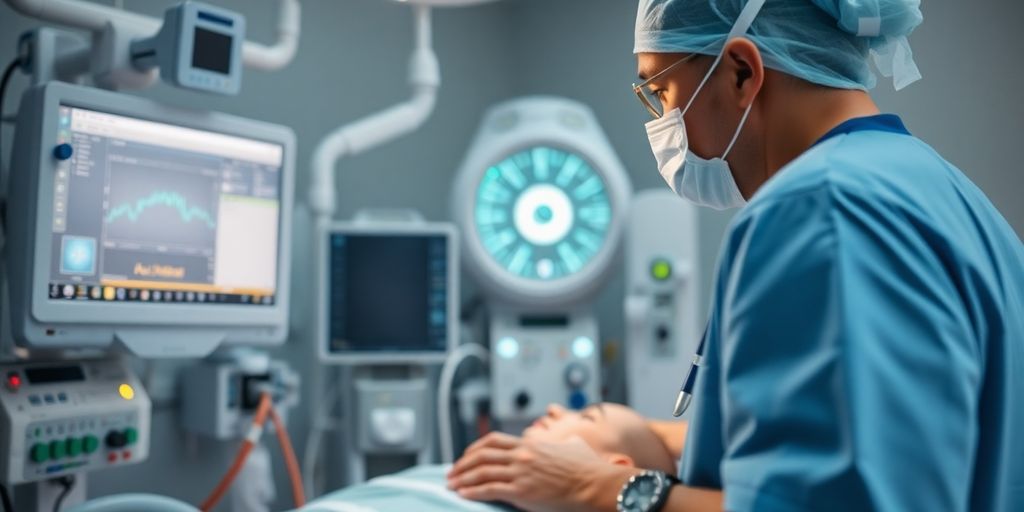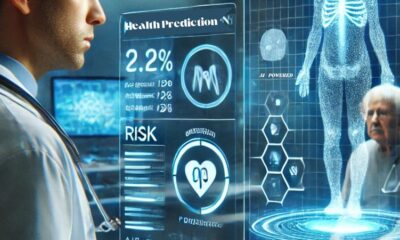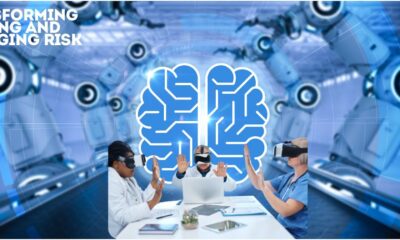Artificial Intelligence
AI in Healthcare: Innovations Saving Lives

Artificial Intelligence (AI) is making a significant impact in healthcare, offering innovative solutions that improve patient care and save lives. From monitoring chronic conditions to enhancing surgical outcomes, AI is transforming how healthcare is delivered. This article explores the various ways AI is being utilised in healthcare, highlighting its ability to increase efficiency, accuracy, and patient satisfaction.
Key Takeaways
- AI helps monitor health conditions, providing real-time alerts to patients and caregivers.
- Imaging technology powered by AI improves diagnostic accuracy and speeds up disease detection.
- Wearable devices and smart systems enable continuous monitoring of critical patients, enhancing care.
- AI assists in personalising treatment plans based on individual patient data and genetic profiles.
- Predictive analytics in healthcare allows for better resource management and proactive patient care.
Constant Monitoring of Persistent Conditions
AI-Driven Insulin Pumps
AI-driven insulin pumps are transforming diabetes management. These smart devices automatically adjust insulin delivery based on real-time blood sugar levels. This technology helps maintain optimal glucose levels, reducing the risk of complications for diabetic patients.
Real-Time Health Alerts
With AI, patients can receive immediate alerts about their health status. For instance, wearable devices can notify users of abnormal heart rates or blood sugar levels. This instant feedback allows for quicker responses to potential health issues, enhancing patient safety.
Improving Quality of Life for Diabetic Patients
AI technologies are not just about monitoring; they also improve the overall quality of life for patients. Here are some benefits:
- Reduced hospital visits due to better management of conditions.
- Increased independence for patients, allowing them to manage their health more effectively.
- Enhanced emotional well-being as patients feel more in control of their health.
AI is changing the landscape of healthcare, making it possible for patients to live healthier lives with less worry about their conditions.
| Feature | Traditional Method | AI-Driven Method |
|---|---|---|
| Insulin Delivery Adjustment | Manual | Automated |
| Health Monitoring Frequency | Periodic | Continuous |
| Patient Alerts | Delayed | Real-Time |
Enhancing Imaging Technology
AI in Radiology
AI is changing the way we look at medical images. It helps radiologists work faster and more accurately. With AI tools, doctors can analyse images like X-rays and MRIs more efficiently. This technology can spot issues that might be missed by the human eye, making it a valuable partner in healthcare.
Automated Disease Detection
AI systems can automatically detect diseases in images. For example, they can identify skin cancer or diabetic retinopathy better than some human experts. This means patients can get diagnosed earlier, which is crucial for effective treatment. Here’s a quick look at how AI improves disease detection:
- Speed: AI can analyse images in seconds.
- Accuracy: It reduces the chances of missing important signs.
- Consistency: AI performs the same way every time, unlike humans who can be tired or distracted.
Improving Diagnostic Accuracy
AI is not just about speed; it also enhances the accuracy of diagnoses. By processing vast amounts of data, AI can learn from past cases and improve its performance over time. This leads to better patient outcomes.
AI is a tool that supports doctors, helping them make better decisions for their patients. It’s not about replacing humans but enhancing their capabilities.
In summary, AI is transforming radiology by making it faster, more accurate, and more reliable. As technology continues to advance, we can expect even greater improvements in how we diagnose and treat diseases.
Monitoring At-Risk and Critical Care Patients
AI is transforming the way we care for patients in critical conditions. These innovations are crucial for saving lives and ensuring timely interventions. Here are some key advancements:
Smart ICU Systems
- Utilises cameras and sensors to monitor patients continuously.
- AI algorithms analyse body movements and facial expressions to detect pain or distress.
- This system allows healthcare providers to respond quickly, even when they are busy with other patients.
Wearable Health Sensors
- Devices like the BioSticker monitor vital signs and other health metrics.
- They provide continuous data on body position, activity levels, and more.
- This information helps doctors tailor treatment plans for patients with chronic conditions.
Continuous Patient Monitoring
- AI systems can alert caregivers to emergencies, ensuring immediate action is taken.
- These tools enhance the quality of care by providing real-time insights into patient health.
- They also reduce the risk of complications by allowing for proactive management of health issues.
AI-driven tools, such as intracranial pressure monitors, provide vital information noninvasively, increasing accessibility and decreasing risk.
In summary, AI is making a significant impact in monitoring at-risk and critical care patients, leading to better outcomes and enhanced patient safety.
Advancing Surgical Outcomes
Predictive Analytics in Surgery
AI is changing the way we approach surgery by using predictive analytics. This technology helps doctors understand the possible outcomes of surgeries. By looking at a patient’s history and current health, AI can suggest whether a surgery is a good idea or not. This means that patients can make better choices about their treatment.
AI-Assisted Surgical Planning
AI tools are now being used to help plan surgeries. These tools can analyse data from previous surgeries to find the best methods and techniques. This can lead to:
- Fewer complications during surgery
- Shorter recovery times for patients
- More accurate surgical procedures
Improving Post-Operative Care
After surgery, AI can help monitor patients to ensure they are recovering well. For example, AI systems can track vital signs and alert doctors if something seems wrong. This continuous monitoring can lead to:
- Faster identification of potential issues
- Better patient outcomes overall
- Reduced hospital stays
AI technologies powered robotic-assisted surgeries have demonstrated immense potential to improve surgical outcomes, reduce human error and facilitate complex procedures.
In summary, AI is making surgeries safer and more effective. By using data and technology, healthcare providers can offer better care and improve the lives of their patients.
Drug Discovery and Development

AI-Powered Drug Screening
The process of discovering new drugs has always been slow and expensive. AI is changing this by helping scientists find new medicines faster. Here’s how:
- Data Analysis: AI can look at huge amounts of data to find patterns that humans might miss.
- Predicting Success: It can predict which drug candidates are likely to work well in humans.
- Cost Reduction: This technology can lower the costs involved in drug development.
Accelerating Clinical Trials
Clinical trials are essential for testing new drugs, but they can take a long time. AI helps speed up this process by:
- Identifying Participants: AI can quickly find suitable candidates for trials based on their health data.
- Monitoring Progress: It can track how patients are responding to treatments in real-time.
- Data Management: AI helps manage the vast amounts of data generated during trials, making it easier to analyse results.
Designing Targeted Therapies
AI is also used to create therapies that are tailored to individual patients. This means:
- Personalised Medicine: Treatments can be designed based on a patient’s unique genetic makeup.
- Improved Outcomes: This approach can lead to better results and fewer side effects.
- Faster Development: AI can help design new drugs that target specific diseases more effectively.
The integration of AI in drug discovery is not just about speed; it’s about transforming the future of medicine. By harnessing the power of AI, we can bring innovative treatments to patients more efficiently than ever before.
Predictive Analytics and Proactive Care
Forecasting Disease Outbreaks
Predictive analytics is changing how we manage health by revolutionising healthcare with predictive analytics. AI can analyse data from various sources, such as patient symptoms and geographical information, to forecast disease outbreaks. This helps in controlling infectious diseases and effectively allocating resources.
Patient Risk Assessment
Machine learning algorithms assess individual patient risks based on:
- Medical history
- Genetics
- Lifestyle choices
This information allows healthcare providers to identify patients at higher risk of developing certain conditions, enabling them to take preventive measures.
Resource Allocation
Predictive analytics also aids in optimising resource allocation. Hospitals can anticipate surges in patient admissions and adjust staffing levels accordingly. This ensures they are prepared to handle fluctuations in demand, leading to better patient care.
By using AI for proactive care, healthcare providers can identify patients who may need interventions early, improving outcomes and reducing costs.
In summary, predictive analytics is a powerful tool in healthcare, helping to forecast outbreaks, assess patient risks, and allocate resources efficiently. As we continue to embrace these technologies, the potential for improved patient care is immense.
Personalised Treatment Plans
Personalised treatment plans are becoming essential in modern healthcare, with AI playing a crucial role in tailoring these strategies to individual patients. By analysing a patient’s unique genetic makeup, medical history, and lifestyle, AI can recommend specific treatments that are more effective and have fewer side effects.
Genetic Profiling for Targeted Therapies
- AI can analyse genetic data to identify mutations in tumours.
- This helps in suggesting targeted therapies that are more likely to work.
- Personalised approaches reduce the reliance on standard treatments, improving outcomes.
Optimising Medication Regimens
- AI monitors patient responses to medications in real-time.
- Adjustments can be made to dosages based on individual reactions.
- This ensures treatments are effective while minimising adverse effects.
Customised Patient Care
- AI systems can predict potential health issues based on daily metrics like blood pressure and oxygen levels.
- Patients receive tailored advice on lifestyle changes to prevent diseases.
- This proactive approach shifts focus from reactive treatment to prevention.
Personalised treatment plans not only enhance patient outcomes but also foster a more engaging healthcare experience.
In summary, AI is transforming how healthcare providers deliver care, making it more tailored and effective for each individual. By leveraging vast amounts of data, AI helps create a healthcare environment that prioritises the unique needs of every patient, ultimately leading to better health outcomes.
AI in Diagnostics and Early Detection
The integration of AI in diagnostics is revolutionising how we detect diseases early. By leveraging advanced algorithms, healthcare professionals can identify health issues at their initial stages, which is crucial for effective treatment. This technology not only enhances the accuracy of diagnoses but also plays a significant role in population-level screening.
AI in Medical Imaging
AI has transformed medical imaging by enabling faster and more precise analysis of images such as X-rays and MRIs. Here are some key benefits:
- Speed: AI can process images much quicker than human radiologists.
- Accuracy: It identifies subtle patterns that may be missed by the human eye.
- Consistency: AI provides uniform results, reducing variability in diagnoses.
Early Disease Detection
The early detection of diseases like cancer is now more achievable thanks to AI. Some notable points include:
- Predictive Analytics: AI can forecast potential health issues based on historical data.
- Risk Assessment: It helps in identifying high-risk individuals for preventive measures.
- Improved Outcomes: Early intervention often leads to better treatment results.
Population-Level Screening
AI’s role in population-level screening is vital for public health. It allows for:
- Efficient identification of at-risk groups.
- Streamlined processes for large-scale health assessments.
- Enhanced data collection for better health insights.
The future of healthcare is bright with AI, as it continues to improve diagnostics and enhance patient care.
In summary, AI is not just a tool; it is a game-changer in diagnostics and early detection, paving the way for a healthier future.
AI in Healthcare Data Management
In today’s healthcare landscape, managing vast amounts of data is a significant challenge. AI technologies are transforming how healthcare organisations handle this data, making it easier to analyse and share information across different departments.
Streamlining Medical Records
- AI systems can quickly organise and retrieve patient records, reducing the time healthcare professionals spend searching for information.
- By integrating various data sources, AI ensures that all relevant patient information is accessible in one place.
- This leads to improved efficiency and better patient care.
Data-Driven Clinical Decisions
- AI helps clinicians make informed decisions by providing insights based on large datasets.
- Predictive analytics can identify trends and potential health risks, allowing for timely interventions.
- This proactive approach can significantly enhance patient outcomes.
Improving Patient Outcomes
- With AI, healthcare providers can personalise treatment plans based on individual patient data.
- AI can also monitor patient progress and suggest adjustments to treatment as needed.
- This continuous feedback loop ensures that patients receive the best possible care.
AI is not just a tool; it is a partner in healthcare, helping to bridge the gap between data and patient care.
| Aspect | Traditional Method | AI-Enhanced Method |
|---|---|---|
| Data Retrieval | Manual search | Instant access |
| Decision Making | Based on experience | Data-driven insights |
| Patient Monitoring | Periodic checks | Continuous tracking |
In conclusion, AI in healthcare data management is paving the way for more efficient, effective, and personalised patient care. As these technologies continue to evolve, they will play an increasingly vital role in the future of healthcare.
AI in Healthcare Administration
Workflow Efficiencies
AI is transforming how healthcare facilities operate by streamlining workflows. Here are some key benefits:
- Reduced Administrative Burden: AI can automate repetitive tasks, allowing staff to focus on patient care.
- Improved Scheduling: AI tools can optimise appointment scheduling, reducing wait times for patients.
- Enhanced Communication: AI chatbots can handle patient inquiries, providing instant responses and freeing up staff time.
Cost-Saving Measures
Implementing AI in healthcare administration can lead to significant cost savings. Some examples include:
- Lower Operational Costs: Automating tasks reduces the need for extensive administrative staff.
- Efficient Resource Management: AI can predict patient inflow, helping hospitals allocate resources more effectively.
- Reduced Errors: AI systems can minimise human errors in data entry and billing, leading to fewer costly mistakes.
Enhancing Patient Experience
AI also plays a crucial role in improving patient satisfaction. Key points include:
- Personalised Interactions: AI can analyse patient data to tailor communications and services.
- Faster Response Times: With AI handling routine queries, patients receive quicker answers to their concerns.
- Proactive Care: AI can identify patients needing follow-ups, ensuring they receive timely care.
The integration of AI in healthcare administration not only boosts efficiency but also enhances the overall patient experience, making healthcare more accessible and responsive.
By leveraging AI, healthcare organisations can navigate the challenges of modern administration while focusing on what truly matters: patient care.
Ethical and Regulatory Considerations in AI Healthcare
As AI technology continues to evolve in healthcare, it is crucial to address the ethical and regulatory challenges that arise. These challenges include:
Data Privacy Concerns
- Patient Data Security: Protecting sensitive patient information is paramount. AI systems must ensure that data is stored and processed securely to prevent breaches.
- Informed Consent: Patients should be fully aware of how their data will be used, ensuring transparency in AI applications.
- Data Ownership: Questions about who owns the data and how it can be used must be clarified to protect patient rights.
Ensuring Algorithm Fairness
- Bias in AI Models: AI systems can inadvertently perpetuate biases present in training data, leading to unequal treatment outcomes. Continuous monitoring is essential.
- Diverse Data Sets: To create fair algorithms, it is important to use diverse data sets that represent various demographics.
- Regular Audits: Implementing regular audits of AI systems can help identify and rectify biases.
Regulatory Compliance
- Adhering to Guidelines: Healthcare organisations must comply with existing regulations while integrating AI technologies.
- Collaboration with Regulators: Engaging with regulatory bodies can help shape policies that ensure safe AI deployment in healthcare.
- Continuous Education: Training healthcare professionals on AI ethics and regulations is vital for responsible use.
The integration of AI in healthcare holds great promise, but it must be approached with caution to ensure that patient rights and ethical standards are upheld.
In summary, while AI can significantly enhance healthcare delivery, it is essential to navigate the ethical and regulatory landscape carefully to protect patients and ensure equitable care.
Conclusion
In summary, the use of artificial intelligence (AI) in healthcare is changing the way we approach patient care and treatment. By helping doctors and nurses work more efficiently, AI not only saves time but also improves the quality of care, which can lead to saving lives. With tools that monitor patients continuously, AI can alert caregivers to any dangerous changes in health, allowing for quicker responses. Furthermore, AI enhances medical imaging, making it easier to spot illnesses early on. As we continue to explore the potential of AI, it is clear that its role in healthcare will only grow, offering exciting possibilities for better health outcomes for everyone.
Frequently Asked Questions
How does AI help in monitoring chronic conditions?
AI can keep an eye on health issues like diabetes by tracking things like blood sugar levels. It sends alerts to patients and doctors if something seems wrong, which can help prevent serious problems.
What role does AI play in medical imaging?
AI helps doctors look at medical images, such as X-rays and MRIs, more quickly and accurately. It can spot signs of illness that might be missed by human eyes.
How does AI improve care in hospitals?
AI is used in hospitals to monitor patients in critical care. It can notice when patients need help, even if the nurses are busy with other patients.
Can AI assist in surgeries?
Yes, AI can help doctors plan surgeries by predicting how well a patient might do after an operation, which helps in making safer choices.
How is AI used in drug development?
AI speeds up the process of finding and testing new medicines. It can analyse data faster than humans, helping researchers discover effective treatments more quickly.
What is predictive analytics in healthcare?
Predictive analytics uses AI to forecast health issues before they happen. It helps doctors identify patients at risk and take action early.
How does AI personalise treatment for patients?
AI looks at a patient’s unique health information to suggest the best treatment options. This means patients get care that is tailored just for them.
What are the ethical concerns regarding AI in healthcare?
There are worries about data privacy and fairness in AI systems. It’s important to ensure that AI is used responsibly and that patients’ information is kept safe.
-

 Press Release7 days ago
Press Release7 days agoCrypto WINNAZ Launches First On-Chain Yield Engine for Meme Coins, Enabling 20x–300x Returns
-

 Press Release4 days ago
Press Release4 days agoBellarium ($BEL) Price Prediction: Could It Hit $5 by 2026?
-

 Press Release1 day ago
Press Release1 day agoClinical Trials Market Set for Robust Growth, Driven by Drug Development Surge and Digital Innovation
-

 Press Release2 days ago
Press Release2 days agoPreventive Vaccines Market to Witness Strong Growth by 2035
-

 Business3 days ago
Business3 days agoHow Managed IT Solutions Help Small Teams Compete at Enterprise Scale
-

 Press Release2 days ago
Press Release2 days agoGreen Bio Chemicals Market Poised for Sustainable Growth amidst Global Shift to Eco-Friendly Alternatives by 2035
-

 Press Release2 days ago
Press Release2 days agoFill-Finish Pharmaceutical Contract Manufacturing Market Expected to Flourish Amid Biopharmaceutical Boom and Global Outsourcing Trend by 2035
-

 Press Release2 days ago
Press Release2 days agoIndustrial Boiler Market Expected to Surpass USD 24.4 Billion by 2035 Amid Growing Demand for Energy Efficiency and Industrialization






























